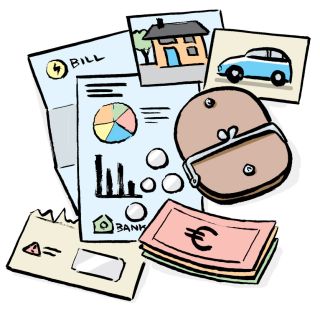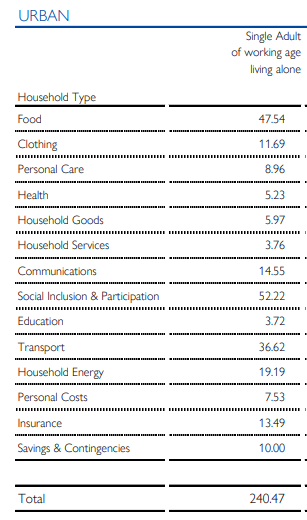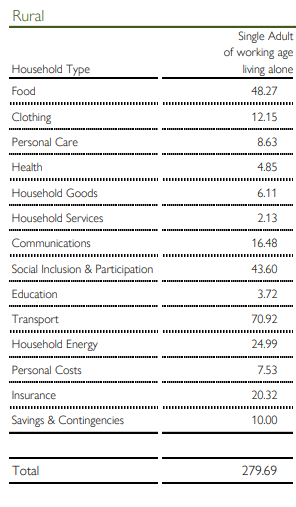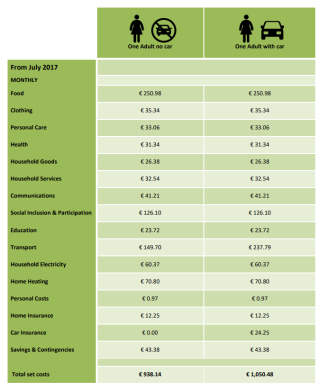The current cost of living crisis is an issue of adequate income

While the recent Government package of measures to address increases in the cost of living were welcome, they fail to deal with the reality of the unavoidable trade‐offs people living on inadequate incomes have to make. For those on a fixed income, any increase in outgoings means difficult and often impossible choices between one basic good and another, "heating or eating".
Core social welfare rates were not increased in either Budget 2020 or Budget 2021, and the increase in Budget 2022 was half of what was required. Social Justice Ireland believes that everyone should have sufficient income to live life with dignity. This means a minimum floor of social and economic resources in such a way as to ensure that no person in Ireland falls below the threshold of social provision necessary to enable him or her to participate in activities that are considered the norm for society generally.
What is considered then to be enough? Should a core social welfare rate be simply a “Sufficiency minimum”, one that caters for very basic, subsistence needs or a “civic minimum”, one based on a fuller set of social needs that recognised wider norms? [1] The current core rate for Job seekers Benefit for a single adult (aged 25 +) is €208 per week. €208 a week to provide for accommodation costs, heat, light, food, clothing, personal care, transport, communications, refuse collection, households goods, health and savings for contingencies. The recent increases in essentials such as energy and food have increased the pressure on making ends meet.
What does it cost to live?
Two widely referenced budgets for Ireland are the Minimum Essential Standard of Living (MESL) from the Vincentian Partnership for Social Justice (VPSJ) and the Reasonable Living Expenses (RLEs) from the Insolvency Service of Ireland (ISI). Both are based on costs incurred by a household and so the comparison to core social welfare rates reveals stark inadequacies.
Minimum Essential Standard of Living (MESL)
The Vincentian Partnership for Social Justice conduct research with focus groups, members of the public to “establish social consensus on what is needed for a minimum living standard”. This is a “Standard of Living which meets physical, psychological and social needs at a minimum but socially acceptable level with a focus on needs not wants and is a standard below which nobody should be expected to live”. They provide costings for different households based on the actual weekly cost of all the over 2,000 items (goods and services) needed to enable a socially acceptable minimum standard of living.
Here is the MESL for a single adult of working age. There is one for rural and one for urban as the costs will differ, mostly due to differences in transport costs. Both require more than €208 a week to achieve that basic standard of living. Neither include accommodation costs and as they date from 2021, the recent increases in food, home energy and fuel costs.


Reasonable Living Expenses (RLEs)
The Insolvency Service of Ireland is the state body that oversees personal insolvencies. As part of their duties, they prepare and issue guidelines as to what constitutes a reasonable standard of living whilst addressing debt problems, an amount that provides for a minimum standard of living during the period of a bankruptcy or other insolvency arrangement. They do use the MESL as a base for their RLEs allowing for “food for a nutritionally balanced diet, clothing, personal care, health, household goods, household services, communications, social inclusion and participation, education, transport, household energy, childcare, insurance and modest allowances for savings and contingencies”. Their figures are calculated on a monthly basis. Instead of a rural/ urban split, the RLE for a single adult is split based on car ownership. For someone without a car, the amount of money needed to provide a basic standard of living for a calendar month is €938.14 which equates to a weekly figure of €216.49. For someone with a car, the amount needed to cover basic costs for a calendar month is €1,050.48 which equates to a weekly figure of €242.43. [2] Again, this basic standard of living requires more that €208 a week, without accommodation costs included. Note that the RLE dates from 2020 so does not include the recent price increases for fuel, home energy or food. An increase was due in March 2022 but has not been finalised at the time of writing.

Benchmark Social Welfare Rates
Society itself is continuously changing and the income people need in order to maintain a basic and decent standard need to reflect current agreed standards of living. A lesson from past experiences of economic recovery and growth is that the weakest in our society get left behind unless welfare increases keep track with increases elsewhere in the economy. Consequently, Social Justice Ireland believes that benchmarking minimum rates of social welfare payments to movements in average earnings is therefore an important policy priority. Government must commit to benchmarking core social welfare payments to 27.5 per cent average weekly earnings by 2023, starting with an additional increase of €5 to core social welfare rates in 2022. The failure to benchmark means that people on core social welfare payments will be left behind again.
[1] Jackson, B. Equality and the British Left. Manchester University Press,2007.
[2] The calendar month amount is multiplied by 12 to arrive at an annual figure which is then divided by 52.